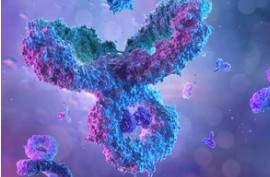Membrane proteins play an important role in both physiological and pathological conditions, and they are targets for many disease treatments. Given that therapeutic antibodies to membrane proteins can recognize membrane proteins with high specificity and sensitivity, the development of therapeutic antibodies to membrane proteins is an important way to treat diseases. However, due to the characteristics of membrane proteins, there are some difficulties in developing membrane protein antibodies, and the preparation of membrane protein immunogens is one of them. Creative Biolabs provides a comprehensive platform for membrane protein research, aiming to solve various difficulties in the process of membrane protein development.

The preparation process of the phage display antibody library includes the following aspects. The complete set of antibody heavy and light chain genes are first cloned separately. Then they are expressed as molecules of single-chain antibody (scFv), single domain antibody (VH or VL), or Fab antibody, fused with structural proteins of phage particles (mainly P3 protein). And finally, the antibody is displayed on the surface of the phage particles. Since the display of antibodies on the surface of phage particles contains antibody genes inside, the coupling or unification of functional phenotype and genotype is accomplished. This in turn allows the use of affinity elution to obtain antibody genes through a phenotypic screen in which antigen and antibody are specifically bound.
Hybridoma technology is the earliest monoclonal antibody preparation technology and the most mature one. The generation of hybridoma technology has greatly facilitated the development of monoclonal antibodies. Therefore, the development of antibodies using hybridoma technology occupies an important position in the development of membrane protein antibodies. With the advancement of research and technology, scientists have developed more and more methods that can effectively facilitate the development of membrane protein antibodies using hybridoma technology.
Antibody libraries are used to clone a complete set of antibody heavy and light chain variable region genes by gene cloning techniques and then recombine them into specific prokaryotic expression vectors. E. coli is then transformed to express functional antibody molecule fragments, and specific antibody variable region genes are obtained by affinity screening. Antibody library technology mimics and simplifies the process of generating specific antibodies from natural antibody libraries, allowing antibody selection to be tailored to human needs. The technology operates in vitro, and through continuous optimization of specific antibody selection strategies and antibody engineering design, new functions are conferred to antibodies that are not possible in their natural state.
Currently, the use of antibody library technology not only allows for the screening of specific antibody fragments but also enables the modification of existing antibody molecules, such as reducing antibody murine origin and improving their affinity and stability. The latter is also referred to as antibody-directed evolution, and the antibody library used is referred to as a directed evolution antibody library. Since the entire process of ribosome display technology is performed in vitro, it does not require the transformation of E. coli for cloning and expression, and it is easier to introduce mutations and build high-capacity mutation libraries, and it is convenient to perform multiple rounds of repeated screening, making it a good tool for in vitro directed evolution of antibodies.
Humanized transgenic mice are an important tool for the preparation of fully human antibodies. The preparation of antibodies using humanized transgenic mice is to allow antigen-antibody immune reactions to take place in mice. Therefore, the integrity of antibody class conversion, the diversity of antibody clone selection, and the natural mechanism of antibody affinity maturation, such as the occurrence of antibody gene rearrangement in the bone marrow and the induction of high-frequency mutations in somatic cells by antigens from lymph node generating centers, are ensured, resulting in good affinity, stability and solubility of the antibodies obtained by this technique.
Introduction to Membrane Protein Antibody Discovery and Phage Display
Introduction to Membrane Protein Antibody Discovery and Hybridoma
Introduction to Membrane Protein Antibody Discovery and Premade Antibody Libraries
Introduction to Membrane Protein Antibody Discovery and Humanized Transgenic Mice
GPCR Production and Anti-GPCR Antibody Development
Transport Protein Production and Anti-Transport Protein Antibody Development
Other Membrane Proteins and Corresponding Antibody Development
Creative Biolabs would like to share with you the key points and experiences in membrane protein antibody discovery strategies to facilitate the smooth running of your project.
All listed services and products are For Research Use Only. Do Not use in any diagnostic or therapeutic applications.